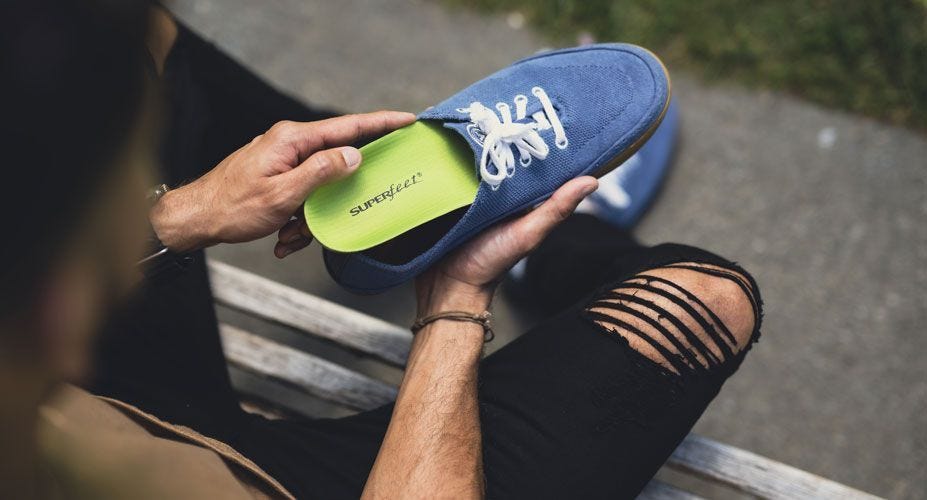
At Superfeet, we believe everyone deserves to feel great on their feet, whether running, hiking, working, or getting the most out of life with the right support in every step. That’s why we offer a wide range of insoles designed specifically for many different types of feet and footwear. From cushioned, flexible comfort to firm, stabilizing support, there’s a pair of Superfeet for you.
We also offer insoles in a variety of arch heights. Read on to find out the best way to match the perfect insole arch height to your feet.
What arch height are my feet?
Feet come in all shapes and sizes. Some feet are mostly flat from heel to toe, some have tissue that forms a high arch shape in between the heel and forefoot. Most people fall somewhere in between, and all are considered normal.
As you place your foot on the floor, if most or all of the inside of your foot touches the ground, you likely have lower arches. It can be harder to tell the difference between medium and high arches.
Here’s a quick and easy test (it works the same with or without socks) that can help narrow down what type of arch you have. First, grab a pencil, preferably one with an eraser on the end, then plant your foot on a flat surface. Make sure to put the same amount of weight on your foot as you would if you were standing normally. Next, point the eraser of the pencil at the arch of your foot, and slide the pencil underneath the highest point of your arch.
If the pencil stops at the eraser, you likely have low arches. If most or all of the ferrule (the silver part that holds the eraser) fits underneath your foot, then you likely have medium arches. If you can slide the pencil farther under your foot so that it surpasses the ferrule and more, then you likely have high arches.
This test is meant to be a starting place, particularly if you have never considered the arch height of your feet. It is by no means a scientific comparison, but it does provide a general idea of your arch height in an easy-to-do way.
Insole Arch Height: Comfort is Key
Once you have an approximate idea of how high your arches are, finding support under your feet that feels the most comfortable to you is the most important thing to enjoy the full benefits of Superfeet insoles. People with high arches generally find insoles with a high-arch shape to fit the best, and the same goes for those with medium and low arches.
That said, personal comfort can vary from person to person. Some people with lower arches like the shape that firm, high arch insoles like Superfeet All-Purpose Support High Arch give their feet. The best way to think about which insole arch height will work for you is to consider how much support and “presence” you like to feel under your feet. High arch insoles will provide more presence (a “higher dose” of Superfeet shape) than insoles with low arches.
Which insole arch height should I choose?
Keeping your own comfort preferences in mind is most important, but another factor determining which insoles you choose is the type of footwear you will be wearing them in. The geometry of some (but not all) low-arch Superfeet insoles, like Run Support Low Arch and All-Purpose Support Low Arch, makes them thinner, which means they can fit better in tight shoes. An athlete with high arches may wear Run Support Low Arch insoles in certain slim-fitting footwear because having Superfeet shape that fits the best is better than not having that support in every step.
Superfeet insoles at any arch height will usually fit well in most shoes with removable liners. If you are new to wearing Superfeet, or are still unsure of which arch height will be most comfortable for you, try a medium arch insole like Run Cushion Medium Arch or All-Purpose Support Medium Arch. You can always try a pair designed for all arch heights (and made with memory foam cushioning) like Casual Support insoles.
No matter your arch height, cushioning preference or type of footwear, Superfeet insoles can provide that missing puzzle piece of support that perfectly fits in between the contoured shape of your feet and the flat surface inside your shoes.





